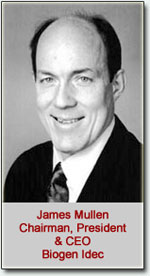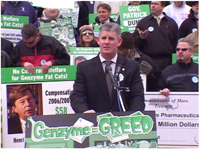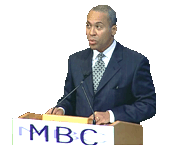Biogen Idec = Greed
Biogen Idec
Corporate Headquarters
14 Cambridge Center
Cambridge, MA 02142
Phone: 617-679-2000
Fax: 617-679-2617
public.affairs@biogenidec.com
www.biogenidec.com

President & Chief Executive: James C. Mullen
Full-Time Employees: 4,750
2009 Net Sales: $ 4.4 billion
2008 Net Income: $977 million
James C. Mullen
Chairman, President & Chief Executive
2008 Compensation from Biogen Idec: $31,054,217
2007 Compensation from Biogen Idec: $17,650,197
2006 Compensation from Biogen Idec: $19,248,602
• member of the Board of Directors of PerkinElmer Inc.
• member of the Board of Directors of the Biomedical Science Careers Program Inc.
Executive Compensation
Executive |
Year |
Total Comp |
James C. Mullen, Pres. & CEO |
‘08 |
31,054,217 |
‘07 |
17,650,197 |
|
‘06 |
19,248,602 |
|
Paul J. Clancy, EVP & CFO |
‘08 |
3,809,298 |
‘07 |
1,952,243 |
|
Peter N. Kellogg, former EVP |
‘07 |
14,533,842 |
‘06 |
4,930,865 |
|
Cecil B. Pickett, President-R&D |
‘08 |
9,988,017 |
‘07 |
10,010,633 |
|
Hans Peter Hasler, Former COO |
‘08 |
5,125,234 |
Robert A. Hamm, COO |
‘08 |
4,425,053 |
‘07 |
4,435,100 |
|
‘06 |
4,204,330 |
|
Burt A. Adelman, former EVP-Portfolio Strategy |
‘07 |
9,402,655 |
‘06 |
6,299,805 |
Note: Kellogg and Adelman were not among the highest paid officers whose 2008 compensation was reported in the 2009 proxy.
(***CLICK to View the Entire Table)
Board of Directors
Mr. Bruce R. Ross (Non-Executive Chairman)
Bruce R. Ross was appointed Chairman of the Board in January 2006. Mr. Ross is currently President of Cancer Rx, a healthcare-consulting firm. Mr. Ross began serving as a Director of IDEC Pharmaceuticals in 1997. Ross's compensation as Non-Executive Chairman of the Board in 2007 was $563,505.
Mr. James C. Mullen
See above
Mr. Lawrence C. Best
Mr. Best began serving as a Director of Biogen in 2003. He is also a director of Haemonetics Corp.
Mr. Marijn E. Dekkers
Marijn E. Dekkers is President and Chief Executive Officer of Thermo Fisher Scientific Inc.
Alan B. Glassberg, M.D.
Dr. Alan B. Glassberg is a Venture Partner and member of the Scientific Advisory Board of Bay City Capital, a firm that manages investment funds in the life sciences industry. He currently serves as a consultant to Poniard and as a member of its Clinical Advisory Board. Dr. Glassberg began serving as a Director of IDEC Pharmaceuticals in 1997.
Ms. Nancy L. Leaming
Nancy L. Leaming retired in 2005 as President and CEO of Tufts Health Plan. Ms. Leaming is currently a member of the boards of directors at Hologic Inc., Edgewater Technology Inc., the Massachusetts Taxpayers Foundation and the American Red Cross of Massachusetts.
Mr. Robert W. Pangia
Robert W. Pangia is currently a partner in Ivy Capital Partners LLC and general partner of Ivy Healthcare Capital L.P., a private equity fund specializing in healthcare investments. Mr. Pangia began serving as a Director of IDEC Pharmaceuticals in September 1997. He is also a Director of McAfee Inc.
Stelios Papadopoulos, Ph.D.
Dr. Papadopoulos is affiliated with New York University Medical Center as an Adjunct Associate Professor of Cell Biology. He is a member of the board of directors of Neuronyx Inc. and vice chairman of the board of directors of BG Medicine Inc., both privately held life sciences companies. In the not-for-profit sector, Dr. Papadopoulos is co-founder and Chairman of Foundation Sante, a member of the board of visitors of Duke University Medical Center. Dr. Papadopoulos began serving as a director of Biogen Idec in 2008.
Cecil B. Pickett, Ph.D.
Cecil B. Pickett, Ph.D., has served as President, Research and Development, at Biogen Idec since September 2006.
Brian S. Posner
Brian S. Posner, a private investor, began serving as a director of Biogen Idec in 2008.
Lynn Schenk
Lynn Schenk is an attorney in private practice. Ms. Schenk began serving as a Director of IDEC Pharmaceuticals in 1995. She is also a member of the Board of Trustees of The Scripps Research Institute.
Phillip A. Sharp, Ph.D.
Phillip A. Sharp, Ph.D., is Institute Professor at the Massachusetts Institute of Technology and a faculty member in the Department of Biology and the Center for Cancer Research. Dr. Sharp co-founded Biogen Inc. He is also co-founder (2002), Director and Chairman of the Scientific Advisory Board of Alnylam Pharmaceuticals Inc. and director of Magen BioSciences Inc.
Mr. William D. Young
William D. Young is Chairman and Chief Executive Officer for Monogram Biosciences Inc.. Mr. Young began serving as a Director of IDEC Pharmaceuticals in 1997. He is also a Director of Monogram Biosciences Inc. and Theravance Inc.
Sensitive Issues
In 1994 members of the Carpenters union leafleted at the construction site for Biogen's new research and office facility in Cambridge, Massachusetts. The union was protesting what it said was the failure of the company's general contractor, Marshall, to live up to a verbal assurance that it would use union carpenters on the project. Protesters called on the City Council to rescind a 15-year, 47 percent property tax abatement that had been given to the company in connection with the project. The company denied it had agreed to use union carpenters. It said its construction manager, Marshall Contractors of Rhode Island, had chosen both union and non-union subcontractors.
In October 2002 the Food and Drug Administration sent a warning letter to Biogen about what the agency said were misleading claims in the materials used to promote its Avonex multiple-sclerosis drug. The claims had to do with patient satisfaction rates for the medication.
In May 2004 Biogen Idec's Executive Vice President for Research, Nabil Hanna, resigned after the Securities and Exchange Commission launched an investigation into his trading of another company's stock. In April 2005 he agreed to pay $372,000 to settle charges that he used confidential information to profit on a stock trade involving a company called Regeneron Pharmaceuticals.
There were press reports in March 2005 (including the 3/2/05 issue of the Los Angeles Times) that top Biogen Idec insiders sold some $15 million in company shares at near-peak prices just before the firm announced problems with its multiple sclerosis drug Tysabri and removed it from the market. After the SEC began an investigation of the insider trades, the company's top lawyer, Thomas J. Bucknum, suddenly resigned. He later paid $3 million to settle charges of insider trading.
At the same time, several shareholder class-action lawsuits were filed, alleging that the company and its Irish partner Elan Corp. improperly concealed negative information about Tysabri prior to the announcement. (The cases were dismissed in 2007.)
Because of continuing problems with Tysabri, Biogen Idec sold off a large manufacturing facility in Oceanside, California in June 2005. Most of the 430 employees at the plant were hired by the purchaser of the property, Genentech, but about 140 were laid off by Biogen. Some 160 employees at Biogen's Research Triangle Park plant were also eliminated.
In December 2008 the company announced plans to move its headquarters from Cambridge to Weston, MA.
Below are excerpts from news articles highlighting troubling issues with the company. See for yourself, and draw your own conclusions.
Council Puts Off Bicycles,
121A Questions on Sidewalks,
Tax Break Referred to Other Bodies
By TODD F. BRAUNSTEIN
The Harvard Crimson / August 02, 1994
http://www.thecrimson.com/article.aspx?ref=500561
In its annual midsummer's meeting, the Cambridge City Council referred to other bodies two important items on bicycling and the controversial 121A tax relief clause…
The 121A clause was the focus of a heated special meeting of the council in June.
The council had agreed to award a 47 percent tax break under the 121A clause to Biogen, Inc., a Cambridge biotechnology company. Biogen received the special treatment to undertake a construction project in Kendall Square.
Local 40, the carpenter's union, had originally objected to the tax break. But Mark Erlich, the Local 40 manager, said the union changed its mind when he reached a verbal agreement with Biogen's subcontractors that only union labor would be hired.
With the support of Local 40, the council unanimously approved 121A status for Biogen.
The agreement Erlich claims he had with Marshall, however, was never put into writing, and the subcontractors have hired non-union labor.
A horde of Local 40 representatives stormed the June council meeting and asked the city to repeal the 121A arrangement.
Letter from FDA to Biogen, Inc. about misleading claims in promoting Avonex.
October 24, 2002
http://www.fda.gov/cder/biologics/adpromo/ifnbbio102402.htm
Examples of the violative statements and the requested corrective action include the following:
- 1.The headline, "AVONEX delivers the highest rate of satisfaction—95% among patients," followed by the bar graph representing patient satisfaction, which are prominently presented in the physician and patient brochures and MRI Evidence Flipchart (Tabs A, B and D, respectively), are misleading because they misrepresent the results of the survey. The headline "Strong with Patients" (Tab A) and the results presented are also misleading because they do not identify the number of patients surveyed, thus presenting the information in a way that implies that the study represents a larger experience with the drug than actually occurred. The survey evaluated 75 patients in each of three MS therapies, Avonex, Betaseron and Copaxone. The 95% value stated in the headline only represents the total number of patients (n=75) who responded to the question, " All things considered, how satisfied are you with Avonex?" However, in the Avonex patient group only 60% of the 75 patients were very satisfied while 35% were only somewhat satisfied. The omission of these details is misleading to the reader. You should immediately cease any further dissemination of all advertising and promotional materials that contain these claims and similar presentations.
SEC STEPS UP PROBE INTO TRADING AT BIOGEN
By Jeffrey Krasner
The Boston Globe / April 21, 2005
http://www.highbeam.com/doc/1P2-7896538.html
The Securities and Exchange Commission has stepped up its investigation of alleged insider tradingat Biogen Idec Inc. in connection with stock sales by company officials just before the firm pulled its promising drug Tysabri off the market in February, the com pany said yesterday.
Separately, the former chief scientific officer of Biogen Idec yesterday paid a steep fine to settle unrelated civil charges of insider trading in 2003 brought by the SEC. Nabil Hanna, who resigned from the company in May 2004, also agreed never to serve as an officer or director of a publicly traded company.
Biogen Trading Preceded Warning;
Insiders sold stock prior to disclosure of a death.
The firm says the sales weren't tied to the news.
By Kathy M. Kristof
Los Angeles Times / Mar 2, 2005
http://articles.latimes.com/2005/mar/02/business/fi-insider2
Biogen told the Food and Drug Administration on Feb. 18 that at least one and possibly two patients in trials for the drug had contracted a rare virus. That day, Biogen general counsel Thomas Bucknum sold 89,700 shares for $6 million, reaping a $1.9-million profit, according to Securities and Exchange Commission filings. He had purchased the shares the same day by exercising stock options.
Biogen spokesman Jose Juves said Tuesday that Bucknum's stock sale was planned and executed before he became aware of the illnesses or fatality. Juves said sales by three other Biogen insiders Feb. 14 and Feb. 15 were part of automatic share divestiture programs and also unrelated to the problems with Tysabri.
Biogen and Ireland-based Elan Corp., a partner in developing Tysabri, said that shortly after reporting encouraging results from the drug's clinical trials Feb. 17, they learned that two of the 500 patients in the trial had developed a rare disorder of the central nervous system.
Abstract of LA Times Article, March 2, 2005
Biogen/Elan's Tysabri adds pressure on FDA
By Finfacts Team
March 6, 2005
http://www.finfacts.com/irelandbusinessnews/publish/article_1000719.shtml
Confirmation on Thursday evening that a second patient using the Biogen/Elan multiple-sclerosis treatment, Tysabri, had died from a rare disease, dashed hopes that Monday's suspension of the Tysabri clinical trials would be temporary. Elan's CEO Kelly Martin had spoken earlier in the week of a return to market in the third quarter. On Monday, Biogen Idec and Elan suspended trials of their intravenous therapy after one patient died from progressive multifocal leukoencephalopathy (PML) a disease of the central nervous system. The companies had said on Monday that another patient might also have the disease…
The complaint charges Elan and certain of its officers with violations of the Securities Exchange Act of 1934. Elan is engaged in the development and commercialization of Tysabri, a vaccine designed to treat patients with multiple sclerosis (MS), slowing the progression of the disease and reducing incidents of relapses. Throughout the Class Period, defendants caused Elan to make a number of positive statements about the status of its clinical trials and the commercial potential of Tysabri, causing Elan's stock to trade at artificially inflated prices. The Complaint alleges that Elan violated federal securities laws by issuing false or misleading information. Specifically, defendants failed to disclose and misrepresented the following material adverse facts: (i) that Tysabri (natalizumab), a monoclonal antibody for the treatment of Multiple Sclerosis ("MS"), posed serious immune-system side effects; (ii) that Tysabri, like other MS drugs, made patients susceptible to progressive multifocal leukoencephalopathy ("PML") by changing the way certain white blood cells function, thereby allowing PML, a normally dormant virus, to run rampant within the human body; (iii) that defendants knew and/or recklessly disregarded documented facts that MS drugs can cause greater incidents of PML to occur; and (iv) that defendants concealed these facts in order to fast track Tysabri for FDA approval so that they could reap the financial benefits from the sales of the drug.
TO CUT COSTS, BIOGEN TO SELL FACILITY FOR $408M FIRM
PLANNED TO MAKE TYSABRI AT CALIF. PLANT
By Jeffrey Krasner
The Boston Globe / June 17, 2005
http://www.highbeam.com/doc/1P2-7907674.html
In a move designed to cut costs, Biogen Idec Inc. of Cambridge yesterday said it would sell a new manufacturing plant in California to Genentech Inc. of South San Francisco.
The company had planned to use the plant to manufacture its multiple sclerosis drug Tysabri, which was pulled from the market in February after it was linked to a rare brain disease.
The Oceanside plant was completed in December at a cost of $480 million. Biogen Idec will sell it for $408 million, and will have to take a write-off of $50 million to $57 million after taxes. The amount covers the cost of special equipment used to make Tysabri and expenses associated with getting the plant approved by regulators to …
SEC Litigation Release No. 19528,
January 12, 2006
http://www.sec.gov/litigation/litreleases/lr19528.htm
To settle the Commission's charges, Bucknum has consented, without admitting or denying the allegations in the Commission's complaint, to the entry of a final judgment permanently enjoining him from committing future violations of Section 17(a) of the Securities Act and Section 10(b) of the Exchange Act and Rule 10b-5 thereunder. Bucknum also has agreed to pay disgorgement in the amount of $1,938,465, pre-judgment interest thereon in the amount of $102,005, and a civil penalty of $969,232, for a total payment of $3,009,720. Finally, Bucknum will be prohibited from acting as an officer or director of any publicly-traded company for a period of five (5) years from the date of the entry of the judgment.
Biogen May Have A New Tysabri Problem
By Ed Silverman
Pharmalot / February 7th, 2008
http://www.pharmalot.com/2008/02/biogen-may-have-a-new-tysabri-problem/
A letter to The New England Journal of Medicine details two dramatic, but potentially cautionary tales about Tysabri, Biogen's troubled mulitple sclerosis med…
A 46-year-old woman with MS received her first dose, but then a mole that had been on her shoulder for years suddenly took on a dangerous new character; it turned out to be a melanoma that spread like wildfire and she has just a few months to live, writes Health Day News. And 45-year-old woman with MS developed melanoma in her retina after receiving several doses. She had a family history of melanoma and had atypical moles on her body; the mole on her retina went back at least nine years.
"I can't say it's cause-and-effect definitively because it's just an observation, but the first patient had had that mole forever. She took the drug and almost instantaneously the lesion changed," John Thomas Mullen, co- author of the letter and a surgical oncologist at Beth Israel Deaconess Medical Center in Boston, tells Health Day…
Investors should also be cautious, suggests David Amsellam of Friedman Billings Ramsey, who writes in an investor note this morning that the NEJM letter "raises new concerns about Tysabri safety." Ironically, he points out that the letter is published just one day after Biogen execs told analysts that they expect to see "more liberal usage of Tysabri…"
Tysabri, a monoclonal antibody that helps treat autoimmune disorders such as MS and Crohn's disease, has had a clouded history, Health Day reminds us. The med was first approved by the FDA in November 2004, but was pulled three months later after several patients in clinical trials developed a rare but deadly viral infection of the brain called progressive multifocal leukoencephalopathy. In June 2006, the FDA allowed the drug back on the market but with strict conditions governing its use. Just last month, the FDA approved Tysabri to treat people with a moderate to severe form of Crohn's.
But there is basic science to support Mullen's observations, Health Day writes. One of the participants in an earlier study of Tysabri had developed (and subsequently died of) a metastatic melanoma that appeared as soon as he got his first dose of the drug, Mullen tells the site. And in a study done before Tysabri received FDA approval, melanomas in mice that were given the drug had an increased tendency to detach from the primary tumor and spread.
Tysabari may have a dampening effect on the immune system that encourages the formation of the potentially deadly skin cancer, the letter stated…
Biogen Idec battles $38.9m Mass. tax bill
Cambridge biotech says disputed sales were made by workers in North Carolina
By Todd Wallack
Boston Globe / February 19, 2008
http://www.boston.com/business/healthcare/articles/
2008/02/19/biogen_idec_battles_389m_mass_tax_bill/
Think your tax bill is bad? Check out Biogen Idec's.
The Cambridge biotechnology company says it was stung with an order to pay $38.9 million in additional taxes, interest, and penalties by the Massachusetts Department of Revenue, according to a filing last week with the Securities and Exchange Commission.
Biogen Idec Inc. says the Revenue Department denied its initial appeal in 2006. But the biotech isn't giving up. Biogen Idec filed a petition last year with the Massachusetts Appellate Tax Board seeking the reversal of more than $50 million in state taxes for the 2001, 2002, and 2003 tax years.
"We intend to contest this matter vigorously," Biogen Idec said in the SEC filing. A tax board spokesman said the case is slated to be argued in April…







